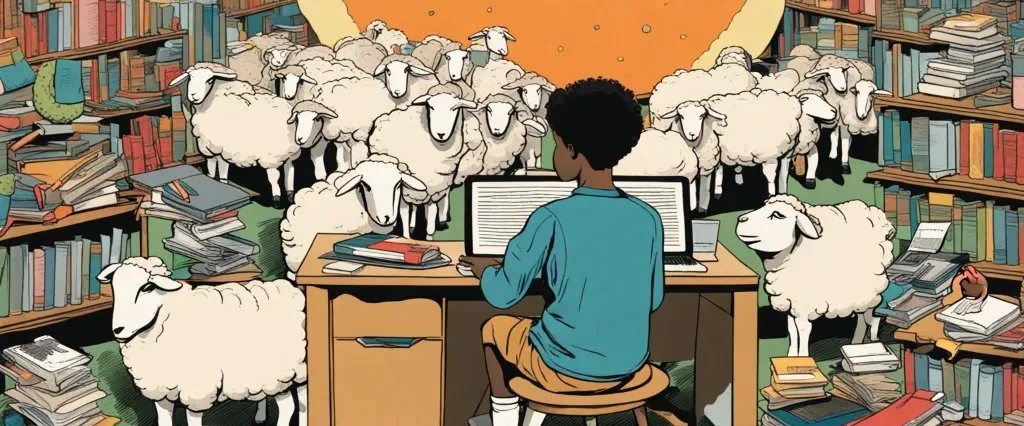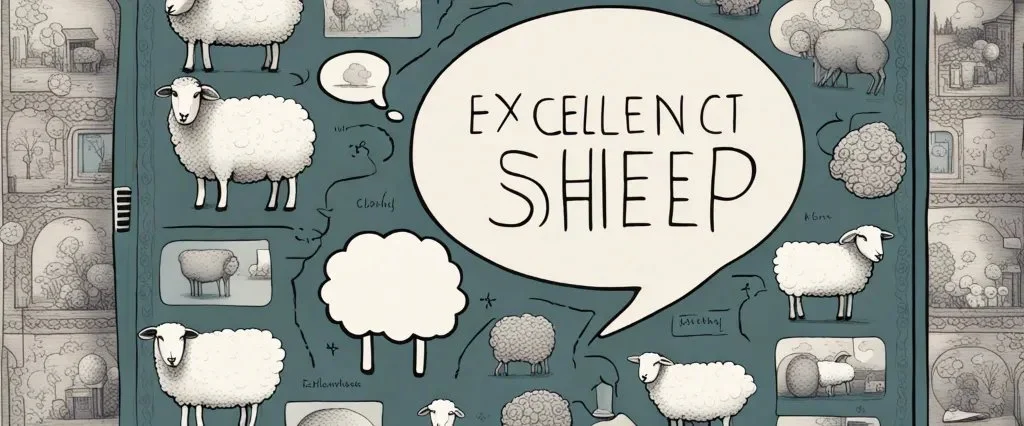The Excellent Sheep: A Revealing Summary of William Deresiewicz's Critique
Chapter 1 What's the Excellent Sheep
"Excellent Sheep: The Miseducation of the American Elite and the Way to a Meaningful Life" is a book written by William Deresiewicz, a former Yale University professor and essayist. In the book, Deresiewicz criticizes the current education system in America, specifically focusing on elite universities, for producing students who are driven solely by external achievements and conformity rather than pursuing their true passions and purpose in life.
The term "excellent sheep" refers to these high-achieving students who, despite their impressive resumes and academic accolades, lack individuality, critical thinking skills, and a sense of purpose. Deresiewicz argues that this system produces graduates who are ill-equipped to deal with the complexities and challenges of the real world, as they have been conditioned to prioritize external measures of success over personal growth and fulfillment.
Throughout the book, Deresiewicz explores the root causes and consequences of this educational culture, discussing topics such as the pressure to conform, the role of technology and consumerism, and the erosion of intellectual curiosity. He also suggests alternative approaches to education that emphasize intellectual and personal development, freedom of thought, and the pursuit of a meaningful life.
"Excellent Sheep" has sparked widespread discussion and debate about the value and purpose of education, particularly within elite academic institutions. It has been praised for its thought-provoking analysis and call for reform in the education system, encouraging readers to question their own definitions of success and reevaluate the purpose of a college education.
Chapter 2 Is the Excellent Sheep recommended for reading?
"Excellent Sheep" by William Deresiewicz has received positive reviews from readers and critics. It addresses the concerns about the modern education system and the pressure students face to conform to elite institutions. Many readers find it thought-provoking and insightful, providing an alternative perspective on the purpose of education and personal growth. It has been praised for its well-researched content and engaging writing style. Ultimately, whether it is a good book will depend on your personal interests and preferences.
Chapter 3 the Excellent Sheep Summary
"The Excellent Sheep: The Miseducation of the American Elite and the Way to a Meaningful Life" is a book written by William Deresiewicz and published in 2014. The book explores the current state of elite education in the United States and argues that it fails to provide students with the skills and mindset necessary for leading fulfilling lives.
Deresiewicz, a former Yale professor, critiques the "factory model" of education prevalent in prestigious institutions, which he argues prioritizes conformity, achievement, and external validation over intellectual curiosity and personal growth. He refers to the students who emerge from this system as "excellent sheep" – they excel academically and follow the rules, but lack a strong sense of self and purpose.
The book delves into the pressures faced by high-achieving students and the impact this can have on their mental health and overall well-being. Deresiewicz argues that they are pushed into pursuing careers that are financially lucrative but do not align with their true passions or values. He suggests that this focus on material success has led to a society that is largely uninterested in activities that do not provide immediate rewards, such as the arts, humanities, and public service.
Deresiewicz proposes an alternative vision of education and success, emphasizing the importance of solitude, self-reflection, and cultivating a sense of purpose. He calls for a return to a more holistic approach to education that focuses on intellectual exploration, critical thinking, and personal growth. He argues that this will ultimately lead to a more fulfilled and engaged citizenry.
"The Excellent Sheep" has sparked widespread debate and reflection on the current state of American education and its impact on individuals and society as a whole. It has been praised for its incisive analysis and thought-provoking ideas, as well as its call for a more meaningful and purpose-driven approach to education.
Chapter 4 Meet the Writer of the Excellent Sheep
The author of the book "Excellent Sheep" is William Deresiewicz. It was first published on August 19, 2014.
Aside from "Excellent Sheep," William Deresiewicz has also written another book titled "A Jane Austen Education: How Six Novels Taught Me About Love, Friendship, and the Things That Really Matter." This book was published on April 26, 2011.
In terms of editions and popularity, "Excellent Sheep" has garnered more attention and acclaim compared to "A Jane Austen Education." It has been widely discussed and referenced in the field of education and has gained a significant readership. Therefore, "Excellent Sheep" can be considered the best-known work of William Deresiewicz so far.
Chapter 5 the Excellent Sheep Meaning & Theme
the Excellent Sheep Meaning
"The Excellent Sheep" by William Deresiewicz explores the concept of the "sheltered" or "coddled" elite college student who is focused solely on getting good grades, pleasing parents and teachers, and eventually securing a prestigious job. The book argues that this singular pursuit of success is detrimental to both the individual and society as a whole.
Deresiewicz argues that the pressure to conform and achieve at top institutions stifles creativity, independent thinking, and personal growth. He criticizes the intense focus on resume-building activities, such as internships and extracurriculars, which he believes leads students to prioritize achievement over genuine intellectual exploration and personal development. He refers to these students as "excellent sheep" because they unquestioningly follow the paths set out for them by society, never daring to challenge conventional wisdom or pursue their own passions.
The book also examines the role of colleges and universities in perpetuating this culture. Deresiewicz argues that admission officers often prioritize standardized test scores and other easily quantifiable metrics over truly valuable qualities like intellectual curiosity and moral character. This, he believes, contributes to the perpetuation of a homogenous student body that is less likely to question the status quo.
Overall, "The Excellent Sheep" serves as a critical analysis of the educational system and the pressures it places on students. It encourages young people to think critically about their own desires and values, rather than blindly following the cookie-cutter path to success that society lays out for them.
the Excellent Sheep Theme
The main theme of "Excellent Sheep" by William Deresiewicz is a critique of the education system and the societal pressure to achieve success at the expense of personal fulfillment and intellectual growth.
Deresiewicz argues that the current education system, particularly the elite colleges and universities, focus too much on creating "excellent sheep" – students who are obedient and high-achieving, but lacking in critical thinking skills and genuine passion for learning. He suggests that these institutions prioritize metrics such as grades and test scores over the development of individuality and intellectual curiosity.
Furthermore, the author criticizes the societal pressures that drive students to pursue prestigious careers and conform to societal expectations of success. He argues that this narrow definition of success leads to a lack of purpose and fulfillment in individuals' lives, as they are disconnected from their own values and passions.
Deresiewicz also explores how these pressures and the quest for external validation contribute to a culture of anxiety and mental health issues among young people. He believes that by prioritizing external markers of success, students often ignore their own well-being and neglect their emotional needs.
Throughout the book, Deresiewicz calls for a reform of the education system and a reevaluation of societal values. He emphasizes the importance of fostering intellectual curiosity, critical thinking, and individuality in education, as well as encouraging students to pursue meaningful and personally fulfilling careers rather than solely focusing on external measures of success. Ultimately, the author seeks to inspire a change in the way we educate and raise young people in order to create a more well-rounded and fulfilled society.
Chapter 6 Various Alternate Resources
1. Goodreads: Goodreads provides reviews, summaries, and discussions related to "Excellent Sheep" by William Deresiewicz. Users can also find related books and recommendations.
2. Amazon: Amazon offers information about "Excellent Sheep," including reviews, ratings, author interviews, and the option to purchase the book.
3. The New York Times: The New York Times has published articles and excerpts related to "Excellent Sheep," including interviews with the author and reviews of the book.
4. The Atlantic: The Atlantic has featured articles and reviews discussing the concepts and ideas explored in "Excellent Sheep" by William Deresiewicz.
5. NPR: NPR has covered "Excellent Sheep" through book reviews, author interviews, and discussions on their various shows and podcasts.
6. The Guardian: The Guardian has published articles and reviews that discuss and analyze the themes and arguments presented in "Excellent Sheep."
7. Forbes: Forbes has featured articles and interviews that explore the concepts and ideas put forth in "Excellent Sheep" and how they relate to higher education and career prospects.
8. YouTube: YouTube has videos featuring interviews, lectures, and discussions with William Deresiewicz, providing additional insights and context about "Excellent Sheep."
9. TED Talks: William Deresiewicz has given a TED Talk titled "Solitude and Leadership," which touches on some of the themes discussed in "Excellent Sheep." The official TED Talk website provides a video and transcript of the talk.
10. Podcasts: Various podcasts have invited William Deresiewicz as a guest to discuss "Excellent Sheep," such as "The Ed Mylett Show" and "Don't Keep Your Day Job." These conversations delve into the book's ideas and their implications.
Chapter 7 Quotes of the Excellent Sheep
Excellent Sheep quotes as follows:
1. "The system has produced a generation of students with excellent technical skills and no ability to ask the hard questions."
2. "Our elite universities have become factories for producing elite graduates who lack the ability to think critically and independently."
3. "The pressure to conform and succeed in our education system is stifling the creativity and individuality of our students."
4. "We have created a culture that values external validation over true self-discovery and personal growth."
5. "The pursuit of excellence has been reduced to a checklist of achievements rather than a journey of self-discovery and personal growth."
6. "We need to redefine success in education to include qualities such as curiosity, empathy, and intellectual independence."
7. "The pressure to achieve good grades and get into prestigious universities has led students to prioritize success over true learning."
8. "Our education system is failing to prepare students for the complexities of the real world."
9. "We need to cultivate a generation of critical thinkers and problem solvers, not simply test takers and grade chasers."
10. "It is time to break free from the culture of excellence and success that is suffocating our students' ability to think independently and creatively."
Chapter 8 Books with a Similar Theme as the Excellent Sheep
Book Recommendation:
1. "Educated: A Memoir" by Tara Westover
In this memoir, Tara Westover takes readers on a remarkable journey from her isolated upbringing in rural Idaho to her eventual education at Cambridge and Harvard. It beautifully illustrates the transformative power of education and the resilience of the human spirit.
2. "The Glass Castle" by Jeannette Walls
Jeannette Walls shares her extraordinary childhood growing up with deeply dysfunctional parents. Despite the hardships she faced, Walls' determination and love for knowledge shine through, making this memoir a poignant reflection on family, resilience, and the pursuit of a better life.
3. "The Immortal Life of Henrietta Lacks" by Rebecca Skloot
This remarkable non-fiction book tells the story of Henrietta Lacks, a poor African-American woman whose cells were taken without her knowledge or consent and used for numerous scientific breakthroughs. Skloot expertly combines biography, science, and social commentary to explore issues of ethics, race, and medical advancements.
4. "Just Mercy: A Story of Justice and Redemption" by Bryan Stevenson
Bryan Stevenson, a prominent lawyer and activist, recounts his experiences defending wrongly convicted prisoners, particularly those on death row. This powerful memoir challenges readers to confront systemic injustice and reflect on the importance of compassion and fairness in our legal system.
5. "Hillbilly Elegy" by J.D. Vance
J.D. Vance's memoir provides an insightful and empathetic account of growing up in a white working-class family in Appalachia. It explores the complex issues of poverty, addiction, and social mobility in rural America. Vance's personal story shines a light on the struggles and often misunderstood culture of this community.
After reading the thought-provoking book "Excellent Sheep," these five additional books offer different perspectives on personal growth, overcoming adversity, and the pursuit of education and justice. Each of these works captivates readers with their compelling narratives, offering valuable insights into the human experience.


